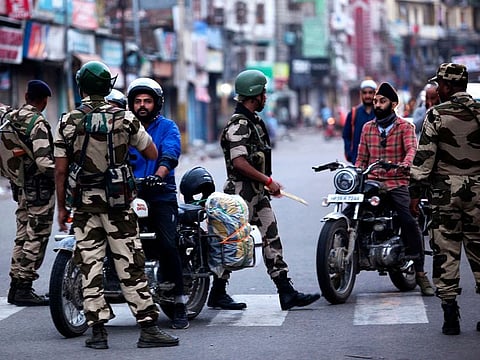How the state of Jammu & Kashmir will cease to exist
In a significant move, India scraps special status of Kashmir

India on Monday scrapped the special status of Kashmir, the Himalayan region that has long been a flashpoint in ties with neighbouring Pakistan, moving to grasp its only Muslim-majority region more tightly.
In the most far-reaching political move in one of the world’s most militarised regions in nearly seven decades, India said it would scrap a constitutional provision that allows its state of Jammu and Kashmir to make its own laws.
Following is the broad framework of how the state of Jammu and Kashmir will cease to exist after the Indian government decision to scrap Article 370 of the Constitution giving special status to Jammu and Kashmir:
The Jammu and Kashmir Reorganisation Bill 2019:
*A Union Territory of Ladakh will be formed
*It will contain Kargil and Leh districts
*A Union Territory of Jammu and Kashmir will be formed
*It will contain all the areas other than Ladakh and Leh
Status of Governor:
*Governor of existing state of Jammu and Kashmir will be Lieutenant governor of Union Territory (UT) of Jammu and Kashmir and Union Territory of Ladakh.
*Representation in Council of States
*Four sitting RS members from J&K will be deemed to be members of Union Territory of J&K. Their term remains unaltered.
Representation in Lok Sabha:
*Union Territory of J&K will have five LS seats
*Union Territory of Ladakh will have one Lok Sabha seat
Lieutenant Governor (LG), Assembly of J&K:
*The provisions contained in Article 239A, which are applicable to 'Union territory of Puducherry', shall also apply to the 'Union territory of Jammu and Kashmir'
* The legislative assembly will have 107 seats with direct elections. (J&K assembly earlier had 111 seats out of which 87 elected)
* 24 seats in Pakistan Occupied Kashmir (PoK) will remain vacant (same as in earlier assembly)
* LG can nominate two women members to the assembly;
* The term of the assembly will be five years (as against six years earlier)
* Central laws have been made applicable to UTs of Jammu and Kashmir and Ladakh
Government proposes delimitation of assembly segments:
* There will be reorganization of assembly segments and constituency maps will be redrawn
* At the moment Jammu region has 37 assembly segments and Kashmir has 46
What Art 370 prevented:
* Implementation of Right to Information
* Right to Education
* Comptroller & Auditor General's scrutiny
* Freedom from Sharia law for women in Kashmir
* Rights to panchayats
* Reservation for minorities such as Hindus and Sikhs
* Indians from other states from buying or owning land in Kashmir
* Stopping Pakistanis from getting Indian citizenship by marrying Indian women from Kashmir.
Sign up for the Daily Briefing
Get the latest news and updates straight to your inbox








